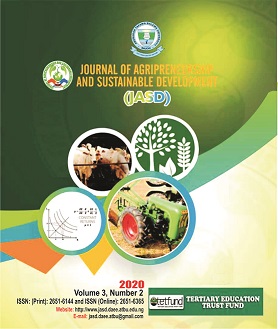ANALYSIS OF SMALLHOLDER FARMERS’ ACCEPTANCE OF IMPROVED TOMATO SEED VARIETIES IN KANO RIVER IRRIGATION PROJECT (KRIP) KANO STATE, NIGERIA
DOI:
https://doi.org/10.59331/jasd.v3i2.128Keywords:
Improved tomato varieties, Logit regression, Perception, technology acceptance modelAbstract
The study analyzed smallholder farmers’ acceptance of improved tomato varieties in Kano River Irrigation Project (KRIP) Kano State. The KRIP areas include; Kura, Bunkure and Garun Mallam. Multistage sampling technique was used to select 181 tomato farmers. Data were collected using structured questionnaires and analyzed using descriptive statistics, logit regression, technology acceptance model and Likert scale. The findings revealed that majority of the farmers were male and educated with mean age of 37 years; 56% had a mean household size of 8 people and 79.6% with a mean of 0.83 hectare of land while about 73% had a mean of 12 years’ experience. Results further revealed that gender (-0.998), educational status (-0.599), household size (-0.104), farming experience (-0.130) and credit access (-0.964) had positive influence on farmers’ acceptance of UC82B, Riogrande and Chibli, respectively, while farm size was significant (P≤0.01) and had negative coefficient on the acceptance of all varieties. Technology acceptance model result reported a positive outcome in terms of ease of usage, perceived attitude, perceived usefulness and intention to continue use for all the varieties. Price instability (72.90%), pest and disease problem (63.00%) and inadequate supply of irrigation water (56.40%) were the main challenges holding back the development of tomato production enterprise. The study concluded that farmers strongly preferred UC82B variety than any other variety and acceptance of new improved tomato varieties is conditioned by farmer perception and preferences. It was recommended that farmers should be encouraged to construct mud cooling chamber in their farms to reduce postharvest loss and market glut; government and non-governmental agencies should provide pesticides at a more subsidized rate; and there is also need for investment in water infrastructure.
Downloads

Downloads
Published
How to Cite
Issue
Section
License
Copyright (c) 2022 Journal of Agripreneurship and Sustainable Development

This work is licensed under a Creative Commons Attribution 4.0 International License.






